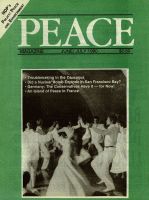
Peace Magazine Jun-Jul 1990, page 27. Some rights reserved.
Search for other articles by Shirley Farlinger here
EVERY JOURNEY begins with the first step. This column is the first in a series designed to be to the Peace Movement what greening is to the environmental movement. Everywhere we are told what must be done every day to bring us a cleaner, healthier and safer environment and preserve our ecology. Steps like re-use, recycle, compost, walk more, consume less. These are indeed important. Some of them will also take money. A realistic look at the global economy points to only one answer-the place to cut down is in military spending estimated at 1.2 trillion dollars last year.
It's not a case of either/or: Either you concentrate on the environment or you work for peace. It's essential to do both and to link the problems together- as in reality they are. For example, the Pentagon uses in one year as much oil and gas as all the public transportation systems in the whole of the U.S. use in 22 years! Six times as much public research money goes for research on weapons in the U.S. as for research on health protection (World Military and Social Expenditures). Not much money is left for the environment either.
So let's begin with our first steps;
1) Buy your light bulbs from any company except General Electric. It is the world's biggest manufacturer of nuclear weapons.
2) Write a letter to your Member of Parliament and explain how you feel about the expenditure of so much money on weapons. Don't be distracted from your main points that the money is being wasted and the manufacture of three or four nuclear bombs every day does not make us more secure.
3) Think about your own workplace. Is there any way in which it contributes to the arms race? Many Canadian companies make parts of military goods under the Defence Production Sharing Agreement and the Defence Industrial Prepardness Agreement Canada has with the U.S. Maybe you could think of other things your company could make if it is in the military business.
4) Many Unions are working on the problems of conversion from military to civilian production. Find out what they are doing and how you could help. Conversion is an idea whose time has come.
5) Check a Peace book out of the library and read it. A good start would be Douglas Roche's Building Global Security or Rosalie Bertell's No Immediate Danger. The information is as overwhelming as the Greenhouse Effect or the depletion of the rainforests-so take it easy, one chapter at a time.
Next time: five more steps. U Shirley Farlinger is an Associate Editor of PEACE.
JUNBI JULY 1990

Peace Magazine Jun-Jul 1990, page 27. Some rights reserved.
Search for other articles by Shirley Farlinger here